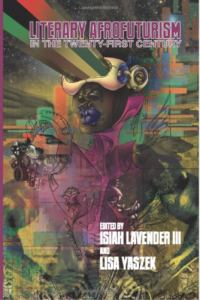For Isiah Lavender III, science fiction isn’t just a passing interest or favorite genre. The Sterling Goodman Professor of English in the Franklin College of Arts and Sciences says science fiction is a storytelling device that can capture the human experience on an otherworldly level.
In this Q&A, he goes over his earliest memory of “Star Wars,” the history of science fiction and Afrofuturism, and his latest book on intersectional science fiction and race and ethnic relations.
How did you become interested in studying science fiction and Afrofuturism?
“Star Wars” is my earliest memory. I remember falling asleep in my dad’s arms as he carried me into the house, and I had missed the lightsaber duel. But both of my parents were avid readers. My mom read lots of science fiction and romance novels, and I read everything over her shoulder. I read a lot of science fiction and had all the Star Wars action figures, all of the Transformers, all of the G.I. Joes. I kind of fell into science fiction and fantasy as a backdrop for pleasure reading.
I did not know that you could study science fiction professionally when I started as a student at LSU. And when I went to Iowa, I did not go there with the intention of being a science fiction scholar. I went there to be a folklorist who studied the trickster figure in African American literature. But I took one class in 20th century ethnic literature, and when “The Matrix” came out, I saw ethnic parallels with some of the works we were reading.
I wrote a paper on that and asked some people in my cohort if we wanted to have a science fiction class. We petitioned the graduate studies committee because there were three big science fiction scholars there at the time, and they said yes. After having only one formal class in science fiction my whole time at the University of Iowa, I did a lot of reading and was asked to do some review work for the journal “Science Fiction Studies.”
The rest, as they say, is history.
How did science fiction come about as a genre?
People debate this but, for me, I find Mary Shelley’s “Frankenstein” to be the first truly science fictional text. Then you have Jules Verne and H.G. Wells, and people like H. Rider Haggard and “Lost Race Tales,” but it was called scientific romance at that time. And then you have dime novels being written in the United States, pre-20th century, but you also have new technologies developing such as the silent film, the lightbulb and the automobile.
So, lots of images of a science fictional type are being generated. You have film developing along the same time as science fiction narrative. “Scientifiction” is a long definition created by Hugo Gernsback for his magazine “Amazing Stories,” which I am proud to say the Hargrett Manuscript and Rare Book Library has a full run of in print. He was interested in Edgar Allen Poe, H.G. Wells and Jules Verne. Those are his fathers of science fiction.
What is Afrofuturism, and how is it connected to science fiction?
W.E.B. Du Bois is known as a science fiction writer, and he published some of his own things during the Harlem Renaissance. I have found this area fascinating, looking at how race operates in science fiction, and pre-Afrofuturism seems to be a hotbed of research that more people could be doing. You have the whole eugenic movement, you have Lothrop Stoddard and his “The Rising Tide of Color Against White World-Supremacy” being written at that time.

You see how race and gender are operating in the background at this time, and you can see it in the figure of the alien, for example. It can be coded as race dialogues or gender dialogues if they’re not outright there in the fiction.
In fact, the Black experience itself is science fiction. Race is an artificial construct, and that’s coming out of the Enlightenment era. So, Africans are taken from the west coast of Africa. They are taken on alien ships by alien people and transported to an alien land where they are forced to speak alien languages and eat alien foods and experience alien religions, all under great duress. They experience psychological, social, physical and mental pain from being ripped away from all that they know.
That is a definition of science fiction, in some sense. If you’re looking for an alien invasion, it already occurred on our own planet between different racial groups or people that look different.
How does Afrofuturism fit into a larger theoretical framework?
My current editing project is called “The Routledge Handbook of Co-futurisms,” where I believe we are existing. If you look at science fiction historically, it starts with Mary Shelley and scientific romance and moves to the pulp era to the golden age of science fiction, to the new wave of science fiction in the 1960s to the feminist explosion of science fiction in the 1970s, to cyber punk in the 1980s and to the new hard science fiction. You begin to see these waves leading to Afrofuturism beginning in 1993, and that led to indigenous futurism around 2006 to Latinx futurisms around 2000 or to techno Orientalism in the mid-90s.
So, you have different racial and ethnic groups writing themselves into the future for the first time. And I call that the colored wave of science fiction. To me, that’s fascinating. Is Afrofuturism going to be a period on its own? Is it a moment or a movement, as I think of it?
It feels like the next Harlem Renaissance, to me. “Black Panther” really gave it some oomph. That brings it to the mainstream’s consciousness. “Get Out” functions in that way, as well, because lots of science fiction is horror. Brain swapping, body transplanting—that kind of thing is future technology, right? But you see how race works in that film. I’ve found those to be watershed moments in the spread of Afrofuturism to the mainstream.
What is the impact of Afrofuturism in media or Black representation in media?
Well, it’s reaching the masses, for one. It’s helping or hindering the breaking down of racial divisions and gender divisions between people. I think it’s more of a help than a hindrance, but you have people talking about race. Seeing the true diversity of human beings in terms of how they self-identify—whether it is race, gender, sexuality, religion or in terms of where they are in class hierarchy.






